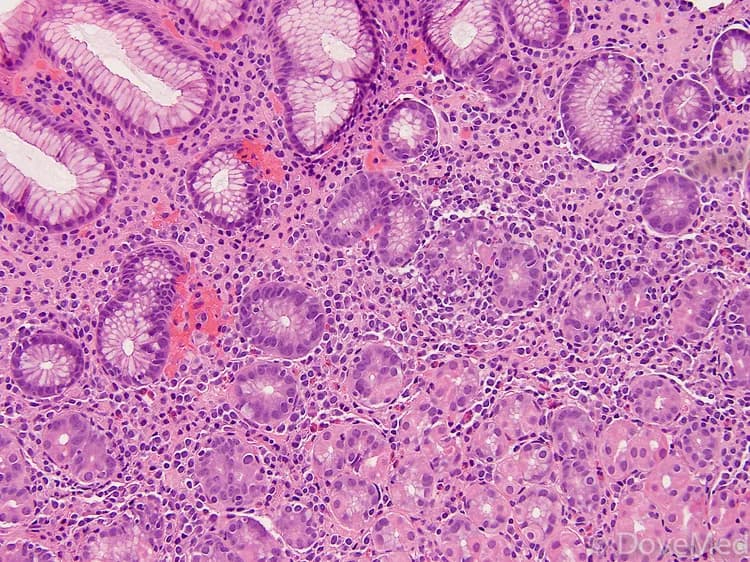What are the other Names for this Condition? (Also known as/Synonyms)
- Chronic Catarrhal Gastritis
- Chronic Dyspepsia
What is Chronic Gastritis? (Definition/Background Information)
- Gastritis is a very common stomach disorder caused by inflammation, irritation, and erosion of the stomach lining
- It may be caused by chemical irritants, infectious organisms (such as helicobacter pylori), and psychological stress; in some cases, the direct cause cannot be determined
- When helicobacter pylorus is present within the gastric mucosa (stomach lining), it results in acute and Chronic Gastritis
- Chronic Gastritis refers to a wide range of problems in the gastric tissues, and is the inflammation in the stomach lining that persists for a long time. Chronic Gastritis is characterized by pain after eating and symptoms of indigestion
The various types of Chronic Gastritis are:
- Chemical
- Radiation-injury induced
- Lymphocytic
- Non-infectious granulomatous
- Eosinophilic or allergic gastritis
Who gets Chronic Gastritis? (Age and Sex Distribution)
- All individuals, irrespective of age and sex, are susceptible to Chronic Gastritis
- Certain population, such as the Japanese and Italians, are more at risk for the condition
What are the Risk Factors for Chronic Gastritis? (Predisposing Factors)
Risk factors of Chronic Gastritis are:
- Use of NSAIDs (non-steroidal anti-inflammatory drugs), such as aspirin
- Alcohol consumption
- Major surgery
- Kidney failure
- Liver failure
- Respiratory failure
- Increase in age
It is important to note that having a risk factor does not mean that one will get the condition. A risk factor increases ones chances of getting a condition compared to an individual without the risk factors. Some risk factors are more important than others.
Also, not having a risk factor does not mean that an individual will not get the condition. It is always important to discuss the effect of risk factors with your healthcare provider.
What are the Causes of Chronic Gastritis? (Etiology)
The following may be the possible causes of Chronic Gastritis:
- Prolonged irritation from the use of non-steroidal anti-inflammatory drugs (NSAIDs)
- Abnormalities of the gastric juice, such as bile reflux (a backflow of bile into stomach from small intestine)
- Excessive use of alcohol
- Infections caused by the bacteria helicobacter pylori
What are the Signs and Symptoms of Chronic Gastritis?
The signs and symptoms of Chronic Gastritis include:
- Dark stools
- Upper abdominal pain
- Feeling of distention, abdominal bloating
- Burning feeling in the stomach, between meals
- Hiccups
- Slight fever
- Recurrent stomach upset, indigestion
- Nausea, vomiting (in some cases, vomiting of blood)
- Loss of appetite
How is Chronic Gastritis Diagnosed?
The following tests are done to diagnose Chronic Gastritis:
- Esophagogastroduodenoscopy (EGD): It is a test to check the linings of the esophagus, stomach, and duodenum. Through this procedure, biopsies may be performed at the same time
- Biopsy showing gastritis
- Stool antigen test, to test for the presence of blood and bacteria (H. pylori) in stools
- Non-invasive tests for H. pylori detection include, serum IgG antibody testing, and urea breath test
- Rapid urease test: An invasive test to detect H. pylori in the gastric or duodenal tissue
- Tests for pernicious anemia
- Serum gastrin level
Many clinical conditions may have similar signs and symptoms. Your healthcare provider may perform additional tests to rule out other clinical conditions to arrive at a definitive diagnosis.
What are the possible Complications of Chronic Gastritis?
Complications that could possibly arise from Chronic Gastritis include:
- Severe loss of blood; hemorrhage
- Ulcer formation; gastric or duodenal ulcer
- Increased risk of stomach cancer
- Impaired vitamin B12 absorption, resulting in pernicious anemia
- Autoimmune disorders
- Gastric (stomach) polyps
- Gastric atrophy
How is Chronic Gastritis Treated?
Treatment of gastritis depends on the cause.
- Antacids, anticholinergics, and other medications, to neutralize stomach acids, are generally recommended for treatment of acute gastritis
- Medications to decrease gastric acid production, such as proton pump inhibitors, are generally considered for worsening symptoms
- Avoid hot and spicy foods; elimination of irritating foods from the diet, helps in treating gastritis
- Take food frequently and in small amounts
- Gastritis caused by H. pylori infection, antibiotics along with acid-blocking drugs, is recommended
- Surgery (partial gastrectomy, pyloroplasty, and vagotomy) is recommended, if medications fail or if any complications develop
Medications for Chronic Gastritis include:
- Bismuth compounds
- Acid-suppression therapy may be used in duodenal ulcer associated Chronic Gastritis
- Sucralfate is used, though its effectiveness may be less
- Misoprostol may decrease symptoms of gastritis
- Ursodeoxycholic acid may reduce symptoms of reflux gastritis
How can Chronic Gastritis be Prevented?
- Controlling risk factors is one way of preventing Chronic Gastritis
- Avoiding or limiting the use of alcohol and other causative agents, may be helpful
What is the Prognosis of Chronic Gastritis? (Outcomes/Resolutions)
The prognosis of Chronic Gastritis is good, if offending agents are removed and early symptomatic treatment is initiated.
Additional and Relevant Useful Information for Chronic Gastritis:
Autoimmune gastritis is an immune-based, non-infectious inflammation of the stomach (gastritis), as a result of antibodies (auto- or self- antibodies) produced in the body, for unknown reason.
Related Articles
Test Your Knowledge
Asked by users
Related Centers
Related Specialties
Related Physicians
Related Procedures
Related Resources
Join DoveHubs
and connect with fellow professionals


0 Comments
Please log in to post a comment.